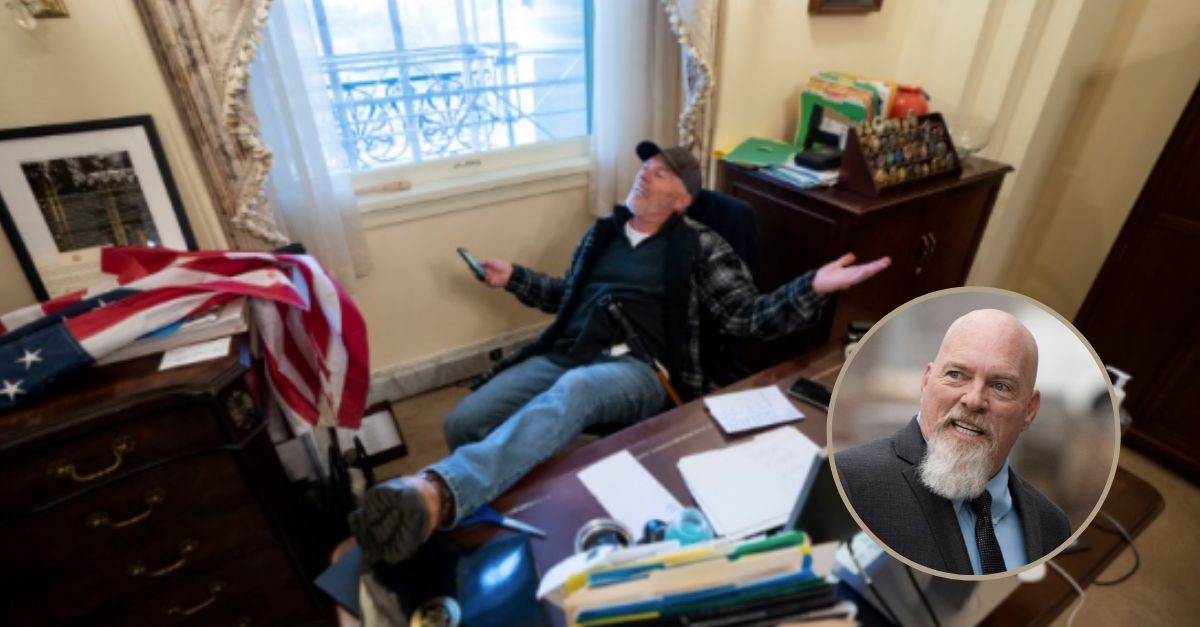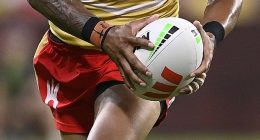
Richard “Bigo” Barnett is seen inside the office suite of then-House Speaker Nancy Pelosi (D-Calif.) during the riot at the U.S. Capitol on Jan. 6, 2021 (via DOJ court filing). Inset: Richard Barnett, an Arkansas man who was photographed with his feet on a desk in House Speaker Nancy Pelosi’s office during the Jan. 6 U.S. Capitol riot, arrives at federal court in Washington, Tuesday, Jan. 10, 2023 (AP Photo/Manuel Balce Ceneta).
The man who brazenly put his boot-clad feet on a desk in the office of then-House Speaker Nancy Pelosi after breaking into the U.S. Capitol on Jan. 6 — with a stun gun plainly visible on his belt — says he can’t afford a lawyer and needs to represent himself on appeal.
Richard “Bigo” Barnett was convicted in January on all eight counts, including civil disorder, obstruction of an official proceeding of Congress, and theft of government property, following a jury trial. He was sentenced in May to 4 1/2 years behind bars and has been ordered to self-surrender to a designated high-security prison facility by Aug. 22.
His first notice of appeal was filed in early June. At that time he appeared to have been represented by counsel.
Circumstances now seem to have changed. In a handwritten motion for permission to represent himself on appeal, Barnett says that he cannot afford to pay a lawyer because he has no income.
“I am under house arrest and expect to self surrender for a 4 1/2 year sentence soon,” Barnett writes in the filing. “A large part of last year’s ‘income’ was selling personal items to cover bills.”
Barnett says that he earns around $2,600 each month through “self-employment. ” He claims to have $2,200 in his checking account, a 2013 Dodge Ram worth $11,000, and around $2,400 in monthly expenses. His filing also notes that he is in debt to the tune of $20,000 for a personal loan.
Read Related Also: Man who filmed cat being kicked like ‘a football field goal’ then doused in gas and lit on fire sentenced to federal prison
As grounds for appeal, Barnett is claiming ineffective assistance of counsel and “abuse of discretion denying motions,” including motions for a venue change, acquittal, and a new trial.
U.S. District Judge Christopher Cooper, a Barack Obama appointee who oversaw Barnett’s trial, granted Barnett’s pro per request on Monday.
He also appears poised to argue that the statutes under which he was convicted are themselves unconstitutional. One of those statutes — 18 U.S.C. § 1512 — has long been the focus of attorneys for accused Jan. 6 rioters, who argue that the statute proscribes obstruction efforts relating to documentary evidence. That theory has been rejected by all but one of the federal district judges in the capital, and the DOJ appealed that ruling.
Read Barnett’s filing, below.
Have a tip we should know? [email protected]









